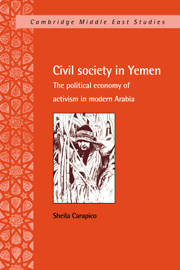Book contents
- Frontmatter
- Contents
- List of tables
- Preface and acknowledgments
- Note on transliteration and terminology
- List of abbreviations
- Map
- 1 Civil society in comparative perspective
- 2 Twentieth-century states and economies
- 3 Islam, tribes, and social services
- 4 Colonialism, activism, and resistance
- 5 Self-help, social capital, and state power
- 6 Unity, pluralism, and political participation
- 7 Civic responses to political crisis
- 8 Political movements, cultural trends, and civic potential
- Endnotes
- Glossary
- Bibliography
- Index
4 - Colonialism, activism, and resistance
Published online by Cambridge University Press: 02 December 2009
- Frontmatter
- Contents
- List of tables
- Preface and acknowledgments
- Note on transliteration and terminology
- List of abbreviations
- Map
- 1 Civil society in comparative perspective
- 2 Twentieth-century states and economies
- 3 Islam, tribes, and social services
- 4 Colonialism, activism, and resistance
- 5 Self-help, social capital, and state power
- 6 Unity, pluralism, and political participation
- 7 Civic responses to political crisis
- 8 Political movements, cultural trends, and civic potential
- Endnotes
- Glossary
- Bibliography
- Index
Summary
In late colonial Aden economic prosperity coincided with governmental efforts to offset dissent by tolerating some forms of association and expression. Although, as noted, political and economic liberalism were half-hearted and restricted, public spaces were expansive: shops, cafes, businesses, parks, schools, libraries, radio, and publications together formed a sort of free market-place of ideas. In this environment, organizational activity flourished. Aden's relative openness, especially in contrast to Sana'a or Taiz, gave rise to a plethora of projects in the nongovernmental public sphere: sports, cultural, and charitable clubs; offices of village associations and their umbrella Yemeni Federation; local, South Yemeni, pan-Yemeni, and pan-Arab political groups; labor unions and the Aden Trades Union Congress; and Adeni as well as pan-Yemeni presses. These projects rather resemble bubbles on the surface of boiling water, appearing and submerging, but they were indeed pluralist, projected public opinion, articulated interests, and offered some state-like social services.
There is a temptation for Westerners to arrange these activities on a Traditional–modern or primordial–civic continuum. Associations with religious, tribal, village, or neighborhood names, or called rābita something or something ahlī, might be dubbed primordial, while urban, intellectual or nationalist initiatives seem more modern. On closer examination, however, the dichotomous distinction between traditional and civic is shown to be a facile heuristic rather than an empirical descriptor.
Yemeni scholars offer other continua that might, but should not, be confused with primordial–civic: local–national, right–left, and rural–urban. Some groups favored narrow localism based on identification with the protectorate statelets or Adeni separatism, others looked to a wider regionalism, on the lines of greater Hadramī, Yāfiī, or Lahjī unity. South Arabian or South Yemeni nationalism translated into support for a federation.
- Type
- Chapter
- Information
- Civil Society in YemenThe Political Economy of Activism in Modern Arabia, pp. 84 - 106Publisher: Cambridge University PressPrint publication year: 1998



